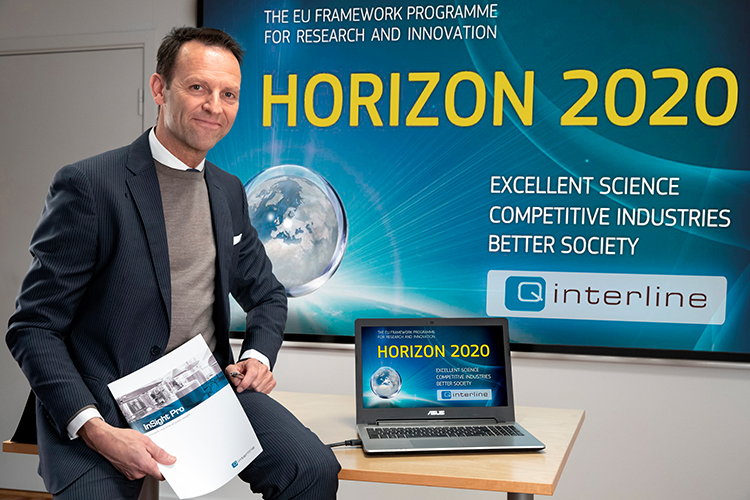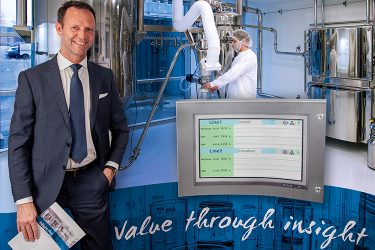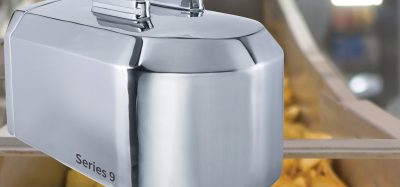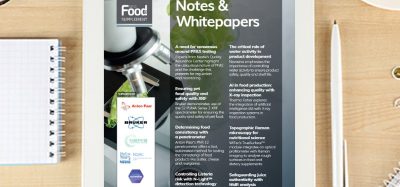How the EU helped high-tech Q-Interline go global
- Like
- Digg
- Del
- Tumblr
- VKontakte
- Buffer
- Love This
- Odnoklassniki
- Meneame
- Blogger
- Amazon
- Yahoo Mail
- Gmail
- AOL
- Newsvine
- HackerNews
- Evernote
- MySpace
- Mail.ru
- Viadeo
- Line
- Comments
- Yummly
- SMS
- Viber
- Telegram
- Subscribe
- Skype
- Facebook Messenger
- Kakao
- LiveJournal
- Yammer
- Edgar
- Fintel
- Mix
- Instapaper
- Copy Link
Posted: 28 January 2019 | Q-Interline | No comments yet
Fortunately, there are plenty of talented and enterprising people who create new innovative products with the potential for growth…


Today, however, the success of many SMEs depends on their ability to commercialise their product for a global market, which requires an amount of capital, resources and know-how that not everyone possesses… but help is available.
About 37 miles outside Copenhagen, we find the small Danish high-tech company Q-Interline. The company develops analytical equipment – both hardware and software – for quality and process control in areas such as food, feed, agricultural and dairy production. The 30-man company was founded in 1996 and has developed a number of high-tech analysers featuring the unique FT-NIR spectroscopy technology over the years. Q-Interline has exported their products to the Nordics and parts of the EU almost from the onset, but competition is fierce – especially when, as a small business, you are up against large global corporations with plenty of capital and thousands of employees, including specialists for every task.
At Q-Interline, however, there was never any doubt about the potential of the products, the technologies used or the benefits for customers. Developing the high-tech analysis devices requires a lot of resources though. This has made it difficult to find resources for commercialisation of the products – and that is a challenge in a globalised world.
Headhunted for EU support
One rainy day in November 2016, CEO and partner at Q-Interline, Martin Roithner Henriksen received a phone call. It was Business Development Centre Zealand (Vaeksthus Zealand) – a business association under the Danish Business Authority – who had been screening the local area for possible beneficiaries of a business support programme under the EU: Horizon 2020. Q-Interline had been identified as a possible beneficiary.
Thanks… but no thanks!
“Sure, we were flattered at first… but support grants… and from the EU… the epitome of slow, unworldly bureaucracy… it was all very far from our DNA. My partner Anders Larsen, founder and technical director of the company, and I did not think very highly of an EU-based grant project and thus kindly declined the offer”, the energetic CEO explains.
What is Horizon 2020?
However, Vaeksthus Zealand did not give up so easily. They elaborated on the project’s opportunities and potential and even offered to pay an external consulting firm to carry out a qualifying preliminary study of the project. On this basis, the same consultancy would then be able to help prepare the actual application. But what is Horizon 2020 really about?
Horizon 2020 is the biggest EU research and innovation programme ever, with nearly €80 billion of funding available over seven years (2014 to 2020). Seen as a means of driving economic growth and creating jobs, Horizon 2020 was launched to provide industrial support for SMEs with a clear growth and export potential. The goal for the EU is to ensure that Europe produces world-class science, improves industrial leadership and removes barriers to innovation.
No cure, no pay
A number of professional consultancies specialising in preparing complex applications for public authorities, private foundations and EU support programmes were identified to Q-Interline. Of these, Nordic Innovators (NI) were selected as the partner to help draft the application for Horizon 2020. The remuneration of Nordic Innovators is in accordance with the no cure/no pay principle, where the fee is a small percentage of the subsidies obtained. Armed with new knowledge of Horizon 2020’s potential for the company, and with the prospect of professional help planning the application, Q-Interline embarked on the project. This would prove to be a defining business adventure for the company with a huge export potential.
Uniqueness is Required


Complete Commercialisation Plan
In order to be considered for funding, a fairly extensive application had to be drawn up. The application was prepared as a detailed, phased work plan of how the product would be commercialised for a global market. Nordic Innovators chose to divide the project into six Work Packages with Tasks, Deliverables, Milestones and associated budgets that would need to be carefully observed if the project were awarded funding. The application’s form, content and level of detail is essential in obtaining support. With competent advice from Nordic Innovators, the project description began.
A hard fight over 3 rounds
After 4 very intense months, the application was submitted in February 2017. “It was no more than one month before we received our answer from H2020. A rejection. Without any real justification, but a score of 12.6 points out of 15. The rejection was accompanied by an EU certificate, a “seal of excellence”, as recognition of our application (this requires >12). We were obviously disappointed, but Nordic Innovators took the rejection in their stride. It is not uncommon to be rejected the first time, they said, and the 12.6 points were not bad at all. They then went into the application again and made a number of changes and resubmitted in May 2017. Four weeks later, we received another refusal, but this time with a points score of over 13. Frankly, at this point, we almost lost heart. However, NI remained steadfast once again and changed some minor details in the application before they submitted it once more. One month later, the decision arrived: APPROVED – YES!!! We were awarded a grant of no less than 837,000 EUR. A very large amount for a small company like ours,” says the enthusiastic CEO.
The deal
The project had to be completed in 20 months. The project finance had to be made up of 70% EU funding and 30% self-financing. The first 45% of the grant was paid immediately at the start of the project. A significant amount of reporting must be done throughout the project to document that QI has met the respective sub-targets within the set deadlines. Vaeksthus Zealand will continually follow up on the project, preparing a report at the half-way mark to be submitted to H2020 for approval. After this, the next 45% of the grant will be paid out. The reporting continues and is constantly monitored. Once the project is complete, an external auditor must review the entire project’s finances and approve these in a final evaluation report. The remaining 10% of the funds are then paid out. If the auditor finds insufficient documentation for the costs incurred, H2020 may demand full or partial repayment of the grant, which underlines the importance of the reports being thorough and timely.
Q-Interline’s yield
Q-Interline set a project start date of 1 October 2017 and just five days later, the first 45% of the grant was received. “After we completed the initial tasks in our plan, we looked for two marketers with international experience, 1 engineer, 1 IT specialist and 1 product specialist. 5 employees in total. The very detailed commercialisation plan made presenting job descriptions, tasks and objectives to the new employees very easy and concrete. Everybody knew their roles, tasks, deadlines and success criteria from day one,” Martin Roithner Henriksen recounts. Now, just one year into the process, he can see the results showing. “We have gained access to Germany’s largest dairy chain, DMK Group, where we have an installation up and running. We gained a foothold in the USA, where we have a pilot project running at a large dairy in Wisconsin, and we have already installed several InSight Pro systems in larger dairies in Ireland, Norway, England and, of course, in Denmark at Arla, who rank among the biggest in Europe.
The CEO concludes: “To us, the benefits of this support scheme have been enormous. We learned a lot from the process, which has forced us to work professionally across the entire commercialisation process. We have been given new knowledge and skills, we have increased our workforce with skilled and inspiring employees, and even gained a number of tangible working methods and models that we can directly apply to new product launches. Horizon 2020 has given us new and greater horizons to explore and strive for,” a happy Martin Roithner Henriksen sums up.
Click here to find out more.
Related topics
Processing, Quality analysis & quality control (QA/QC), Spectroscopy, Technology & Innovation









